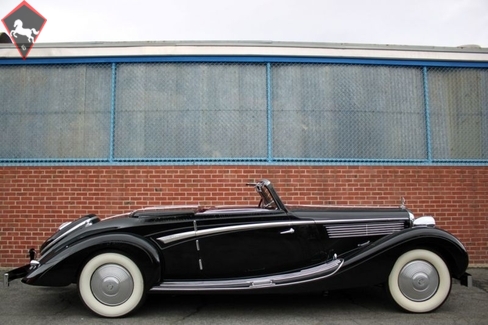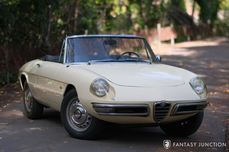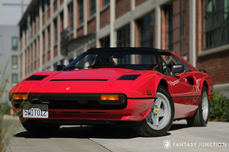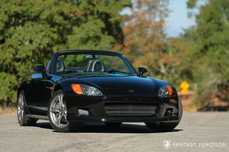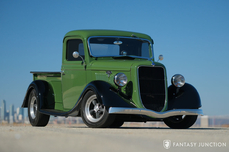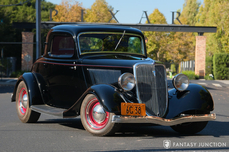Maybach SW38 3.8 Litre Inline 6-Cylinder no. 11164 1938
General description :
1938 Maybach SW38 Roadster with Disappearing Top Coachwork by Spohn
Chassis no. 2055, Engine no. 11164
Black with Oxblood Leather Interior
Maybach is among the most storied and significant marques of the early history of the automobile. The company’s illustrious history predates the invention of the automobile, when Wilhlem Maybach worked closely with Gottlieb Daimler during the development of the very first automobile. Maybach’s concentration was always on engines, and his own inventions included the honeycomb radiator and the atomizing carburetor. During World War I, his engine expertise was employed in a number of aircraft engines, and it was on the basis provided by these engines that the company’s first automobile engines were developed after the war. His original intention had been to produce only engines for automobiles, but upon discovering that most companies preferred to use engines of their own (and usually inferior) design, he decided to manufacture complete cars. These cars were typically Teutonic in construction and execution, and truly represented the pinnacle of engineering and quality. Indeed, no more expensive automobile could be purchased when these cars were new. The cars were truly built to last a lifetime, and featured innovative technological features that were implemented in a breathtaking and beautifully detailed fashion. From the latches on the luggage compartment, to the engine turned aluminum accents in the engine compartment, everything about this car speaks to the craftsmanship and fanatical detail that was applied to what is surely among the finest cars ever made. Even the splash guards inside the rear fender wells are beautifully wrought engine-turned aluminum.
This particular car is one of just two disappearing top SW38 roadsters with coachwork by Spohn. This was the most sporting bodywork available on their most sporting chassis, and in conjunction with an aircraft-derived twin carburetor six-cylinder engine, the SW38 was capable of remarkable performance, including a 95mph top speed. This car is supremely elegant, striking, and well-proportioned, and has received a high quality restoration done some years ago. The car comes with a remarkable sheaf of records dating from the 1950s and 1960s, mostly in German, in addition to magazine articles and some stamps that depict the full line of Maybach automobiles. The car was confiscated during World War II by the Nazis and was thought to have been lost, until it turned up at the Maybach factory in 1956. It was imported to the United States in 1958 by a Mercedes-Benz collector, and was subsequently kept by a woman in Southern California for many years, and occasionally shown locally. It was restored in the early 1990s to high standards by Mike Fennel Restorations, who worked closely with Don Williams of the Blackhawk Collection and won over 150 Pebble Beach Concours d’Elegance trophies over a four decade period. After this car was restored, it was in Japan for a few years before returning to the United States.
This is car makes a strong cosmetic impression with high quality paintwork over well-prepared panels with excellent fit and gaps. The paintwork shows some light wear and blemishes from age, rather than from use such as surface scratches, swirl marks, and a few superficial stress cracks in the paint. The brightwork is a mixture of polished and chromed pieces and is very good to excellent throughout with minor swirls. The glass and lights are excellent as well.
The interior is in similarly nice condition. The leather on the seats has some patina but presents very well overall. The remaining leather on the dashboard and door panels is excellent. The fixtures and gauges are all excellent and of impressive quality and feel, as befits the car`s very high initial price. The carpeting is nearly unworn, and the woodwork is excellent with very high luster and no cracks. The door jambs are beautifully detailed and are finished entirely with engine-turned aluminum.
The engine compartment is very impressive. There is extensive aluminum turned trim throughout, including on the cylinder head cover, air filter housing, intake manifold, and radiator shield. The engine bay shows some dust and oil stains but it is clear that the fundamentals are strong, that the car was restored to high standards, and that it would respond well to a thorough detail.
This is an unparalleled opportunity to acquire an exceptionally unique and elite piece of automotive history. A fully acknowledged car by the Maybach owner’s community, this car’s history and integrity are undoubted. A comparable car in many ways to the Mercedes-Benz 500/540 Special Roadsters, this matching numbers Maybach SW38 Roadster will appeal to seasoned collectors with an eye for an exceedingly rare car which represents the finest form of style and craftsmanship of its era.
http://fantasyjunction.com/cars/1621-Maybach-SW38%20Roadster%20%20%20%20%20%20%20%20%20%20%20%20%20%20%20%20%20%20%20%20%20%20%20with%20Disappearing%20Top%20Coachwork%20by%20Spohn-3.8%20Litre%20Inline%206-Cylinder
1938 Maybach SW38 3.8 Litre Inline 6-Cylinder no. 11164 is listed sold on ClassicDigest in Emeryville by Fantasy Junction for $3300000.
Car Facts
Car type : Car Make : Maybach Model : SW38 Model Version : 3.8 Litre Inline 6-Cylinder no. 11164 Engine size : 3.8 Model Year : 1938 Location : Emeryville Vehicle Registration : Normal
Sold
Seller Information
Sold
Other cars listed for sale by this dealer
About Maybach
Maybach is a German luxury car brand that originated in the early 20th century. Founded by Wilhelm Maybach and his son Karl Maybach, the company gained a reputation for producing high-quality, luxurious automobiles. Here's an overview of Maybach's story, its models in the 1930s, and the reasons why Mercedes-Benz eventually outlived the Maybach brand:Maybach in the 1930s:
Maybach Zeppelin DS 8 (1932–1937): The Zeppelin DS 8 was one of Maybach's flagship models in the 1930s. It featured a powerful V12 engine, advanced technical features for its time, and a luxurious design. The "DS" in its name stood for "Double Six," indicating the twelve cylinders.
Maybach SW and SW 42 (1931–1939): The Maybach SW series included various models, and the SW 42, in particular, was a notable one. It featured a six-cylinder engine and was known for its elegance and performance.
Possible Reasons for Mercedes Outliving Maybach:
Market Dynamics: In the luxury automobile market, Mercedes-Benz positioned itself as a more versatile brand with a range of models catering to various customer preferences. Maybach, on the other hand, focused on ultra-luxury vehicles, which may have limited its market share.
Financial Considerations: Maybach faced financial challenges, especially during the economic downturn in the 1930s. The Great Depression impacted the luxury car market, and Maybach's high-end positioning may have made it more vulnerable to economic uncertainties.
Strategic Decisions: After World War II, Mercedes-Benz and Maybach took different paths. Mercedes-Benz continued to evolve and diversify its lineup, adapting to changing market demands. Maybach, however, faced challenges in re-establishing itself after the war, and the brand struggled to regain its pre-war status.
Brand Recognition: Mercedes-Benz had established itself as a reputable and recognizable brand worldwide. The Maybach brand, while synonymous with luxury and craftsmanship, did not have the same level of global recognition as Mercedes-Benz.
Revival Attempts: In the early 2000s, Daimler AG (the parent company of Mercedes-Benz) attempted to revive the Maybach brand with a new line of ultra-luxury cars. However, this endeavor did not achieve the expected success, and the Maybach brand was eventually discontinued in 2013.
In the end, the Maybach brand faced challenges in adapting to changing market dynamics and recovering from economic setbacks. Mercedes-Benz, with its broader product range, financial stability, and global brand recognition, proved more resilient and sustainable over the years, ultimately outliving the Maybach brand.
